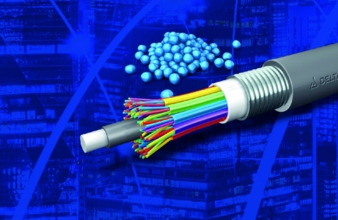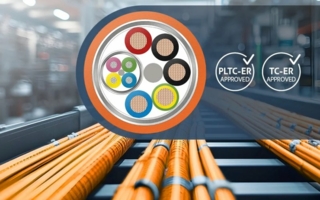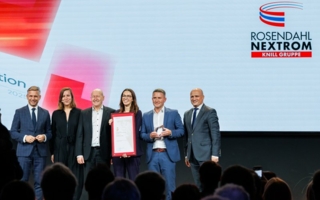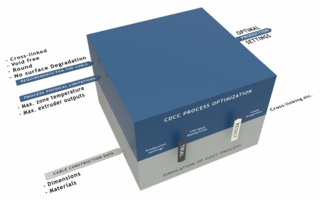15/12/2021 – A response to the needs of businesses and users all over the world
Masterbatch for fibre optic cable
The world no longer works without telecommunications cables. Using them makes transferring information from one point to another via two-way, long-distance communication possible.
Even though telecommunications were initially associated with the telephone and voice-based exchange, everything has changed with the digital transformation, which has made telecommunications possible via a computer or television, which can include videos and data.
All of this has turned telecommunications into a true hotspot attracting business and prompting changes in society’s behaviour. It is clear that virtually all sectors depend on these cables. In fact, the global telecommunications cable market was worth 44.9 billion dollars in 2020 and is forecast to each 74.5 billion by 2028, with a compound annual growth rate (CAGR) of 7% in the period spanning 2021 and 2028.
Types of telecommunications cables change depending on the need. There are essentially three of them: coaxial cable to connect radio transmitters and receivers, connect to the Internet and transmit television signals via cable; twisted cables for Ethernet networks, telephone lines, DSL, security systems and LAN connections; and fibre optic cable, which allows data to be transmitted long distances at high speeds.
Fibre optics: Improving a business that keeps growing
We should focus specifically on fibre optic cable because it is the largest sector, with almost half the market share in global telecommunications sales. This is the type of cable that is the most involved in the new technologies on the horizon, such as 5G and even the future 6G, as well as the Internet of Things (IoT) and all home automation devices.
Within this context, Delta Tecnic has become a global benchmark in colouring telecommunications and specifically fibre optic cables. This company, which is specialised in formulating and manufacturing masterbatch solutions, considers the fibre optic business very important as it accounts for more than 80% of its invoicing in telecommunications cables.
The telecommunications cable industry requires masterbatches that allow high-speed cables to be manufactured which do not interfere with the data transport properties and fit the cable manufacturing processes, which are increasingly automated thanks to the new extrusion technologies. In this regard, Delta Tecnic offers a wide range of masterbatches which adapt to the new demands of the telecommunications sector with specific colours and high opacity, offering clients premium-quality solutions and the top technical level.
These masterbatches are particularly designed not to affect the concentricity of the fibre optic cables, as if this doesn’t remain constant it can cause a decrease in the amount of data sent, clearly lowering their information-transmission capacity.
In terms of the jacketing that protect these cables, Delta Tecnic offers high-performance masterbatches for cables designed for the outdoors where they are exposed to the weather. Thanks to these masterbatches, we can guarantee the mechanical properties of the cables and their identifying colour a long life.
And finally, it has a range of masterbatches of additives especially designed to protect these cable jacketing from unwanted attacks from both rodents and termites. These solutions are designed as repellents and are not toxic for these animals; instead, their properties keep both termites and rodents from damaging the jacketing due to a foul odour or taste or irritation of their nostrils.
These advantages are crucial in a market that just keeps growing due to factors like the increase in the demand for Internet connectivity; the base of online service subscribers; the increasing investment in telecommunications infrastructures; the development of new ultra-quick broadband networks; the rise in 5G networks and edge computing; the growth in cloud platforms; and the expansion of IoT connections.
All of these driving forces are going to affect the demand for connectivity and cables, which entails a higher need for masterbatches. Cables and fibre optic will continue to play an essential role in the future, and this will mean higher production of the related raw materials. Delta Tecnic is prepared to manufacture masterbatches for fibre optic cables, always aligned with the latest trends, in a flexible, cutting-edge way, anticipating a future of unstoppable progress and development.
Author of this article is Pere Garrido, Area Manager Delta Tecnic.
Delta Tecnic
Pol. Ind. Molí de les Planes
Carrer Rec Molí de les Planes, s/n
08470 Sant Celoni
Barcelona/Spain
Tel.: +34 938 674 284
deltatec@deltatecnic.com
www.deltatecnic.com
About Delta Tecnic
Delta Tecnic was born in 1982 to commercialize raw materials in the plastic, cable, ink, paint, and cosmetic industries with the distribution of leading brands worldwide. With more than 38 years of experience and a total of 20,000 m2 in facilities, with three production plants, two of them located in Barcelona (Spain) and one of them in Querétaro (Mexico), Delta Tecnic has grown to position itself as a company leader among Trading companies in Spain, as well as one of the main producers of Masterbatch for the cable and PVC industries globally.
Among the three divisions of Delta Tecnic, DeltaColor Masterbatch stands out, whose production capacity reaches 18,000 t/y. In addition, the division has more than 11,000 developments and 22 production lines. On the other hand, the Delta Trading Pigments and Plastics divisions distribute in leading firms such as Eckart, Cabot, Baerlocher, Cinic, or Aralon.
With 3% of global turnover dedicated to R+D, the company is focused on technological innovation and quality of service, providing deep knowledge of the market and formulations, always optimizing customer processes to become a technology partner focused on product development and innovation. At present, it already exports to more than 60 countries with an export volume of 80%, becoming one of the main players in the market.





